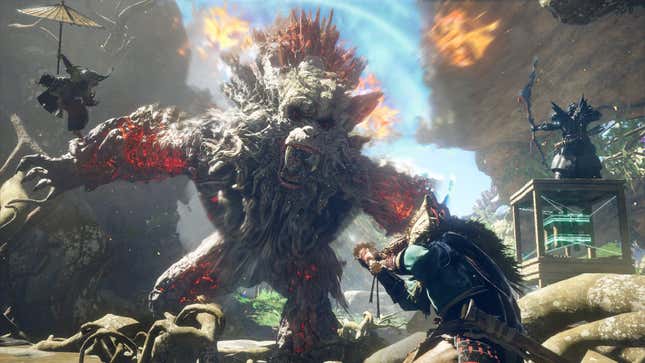
I’ve been having a blast playing Wild Hearts, a Monster Hunter-style action-RPG from the studio behind Dynasty Warriors, and I’ve learned a ton about how to survive its beautiful but brutal Kemono beats in my time with it so far. I’ve come to impart that wisdom to you, dear reader, so that you can avoid some of my early pitfalls and succeed more easily where I previously struggled.
Out February 17 on PS5, Xbox Series X/S, and PC (with a free 10-hour trial on Game Pass via EA Access), Wild Hearts does two things remarkably well. First, it streamlines a lot of the numbers, mechanics, and systems that usually overwhelm new players in a Monster Hunter game. Second, it shakes-up the traditional hunt, kill, loot formula with some extremely versatile and fun building abilities called Karakuri. Together, they make it easy to get right into the action with Wild Hearts, but also easy to miss how everything falls into place. Hopefully, the following tips and advice will fill in the gaps:
Start by playing Wild Hearts alone
Wild Hearts supports multiplayer and cross-play for every story mission, side quest, and hunt. Tempted as you might be to immediately jump into the online chaos, I recommend playing through the first several hunts by yourself. The starting region of Harugasumi Way is lush, gorgeous, and worth taking in at your own pace and without some stranger’s microphone accidentally ruining the mood. Plus the first few bosses are satisfying to beat on your own and offer a gentle learning curve.
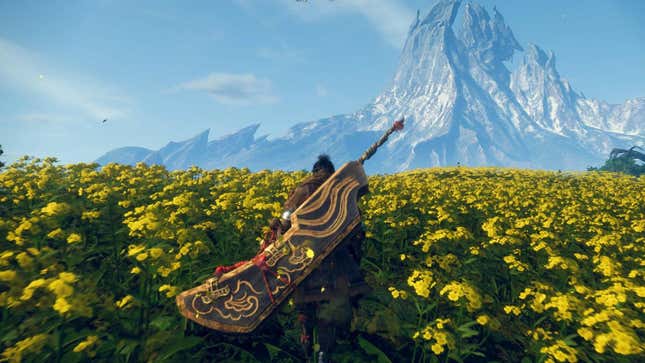
Explore first, hunt later
Each map is full of Kemono to discover, resources to collect, and Dragon Pits to take control over. Unlocking these energy wells will let you build Dragon Karakuri in the surrounding areas and create fast travel points. Large ancient trees, meanwhile, can be activated to create wells where you can replenish your healing water.
Pet the small Kemono
Not everything in Wild Hearts needs to be killed. Small Kemono minding their own business will give you materials if you sneak up behind them and gently pet them. Just make sure your weapon is sheathed and you’re crouched out of sight.
Unlock Dragon Pits and build everywhere
Every Dragon Pit has a certain amount of energy for each element that limits how many total Dragon Karakuri you can build. Even at the lowest upgrade level, it’s usually plenty for building flying vines and hunting towers, your two biggest assets. The first lets you create rope systems to cover lots of ground quickly. The second lets you know what big Kemono are in the area. You want an intersecting network of both.
Basic Karakuri, meanwhile, aren’t just for combat. Place crates near ledges and litter springs across paths to help you get around zones more quickly. You can also place them in advance of big hunts to save time and resources once a hunt has started.
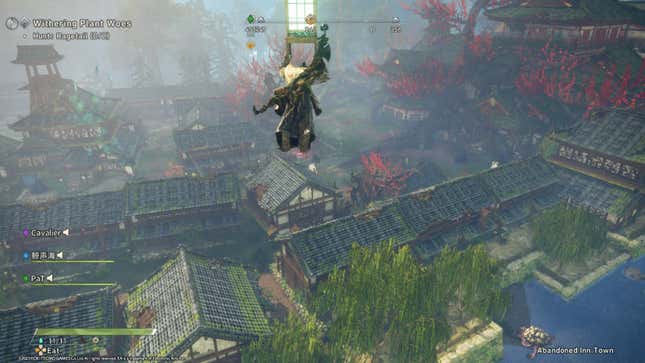
Ask for help if you need it
While Wild Hearts has a few dedicated ways for you to search for online players to journey with, you can also request someone come into your game to help out at any time during a hunt, similar to Elden Ring. Struggling with that Lavaback? Hover over its icon on the map menu and select “request help” right from the jump to give online players a chance to come to your aid.
Play side quests and repeat-hunts on multiplayer
The farther you get in Wild Hearts, the more you’ll be incentivized to go back and grind old hunts like the Ragetail to acquire more crafting materials and orbs needed to upgrade your gear and Karakuri abilities. Characters in Minato will also frequently give you side quests that require hunting the same Kemono additional times. You can make quick work of these by choosing the “Join Session” option when you select the activity from the main map.
Don’t rush and don’t worry if you die
Most hunts give you 60 minutes and three lives to complete them (multiplayer sessions share the same pool of lives but can revive one another). While dying severely decreases the number of orbs you get from defeating a large Kemono, the loot will be the same, and that’s usually what you’re after, in addition to getting any monetary reward attached to the hunt. So take your time and don’t freak out.
Kemono will normally move zones at least two or three times during a fight depending on how quickly you deal damage. It can feel like you’re losing ground each time, but the Kemono aren’t recovering during these phases. While Wild Hearts doesn’t have enemy health bars, a little skull will appear next to the Kemono when it’s ready to bite it. These brief chases are also a great time to scour nearby areas for more healing waters to replenish your supply.
Press L2/Left Trigger constantly while out in the field
Wild Hearts is littered with materials to harvest as you run by. Rather than stopping every five seconds your best bet is to just compulsively press L2/Left Trigger while exploring, especially because a lot of the things you can pick up often look like they are part of the environment.
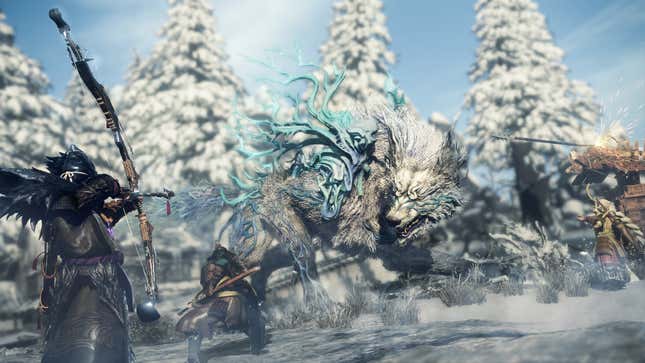
Clear out your inventory occasionally
Your inventory will fill up, especially your ingredients slots. You can eventually build ingredient cabinets to store your extras, but it’s also a good idea to sell off the ingredients and materials you find you’re collecting most frequently when you’re back in town. You can always use the extra gold.
Stay fed
You won’t be at your most effective during a hunt unless your hunger meter is full. But don’t just shove anything in your mouth. Pay attention to the temporary stat bonuses from each piece of food and use the ones that seem most helpful for the hunt you’re about to go on (like fire damage for an ice boss, etc).
The glowing patches on big Kemono aren’t weak spots
As you damage Kemono in the course of a fight, light green patches will appear. They look like weak spots but they are actually spots you can grab onto with R2/Right Trigger using your Hunter Arm ability. Doing so will overfill your thread count letting you unleash a flurry of Karakuri abilities all at once.
Three crate jumping attacks are deadly
The crate Karakuri is the first ability you get in Wild Hearts, and it’s way better than it might initially seem. Stacking crates three high and then jumping off and using a strong attack with your katana will unleash a plunging attack that does tons of damage on the way down.
Use springs to avoid big attacks
While jumping off a spring will combo you into a more powerful attack, it will also get you out of the way of incoming attacks quickly, and even grant you a couple of extra invisibility animation frames.
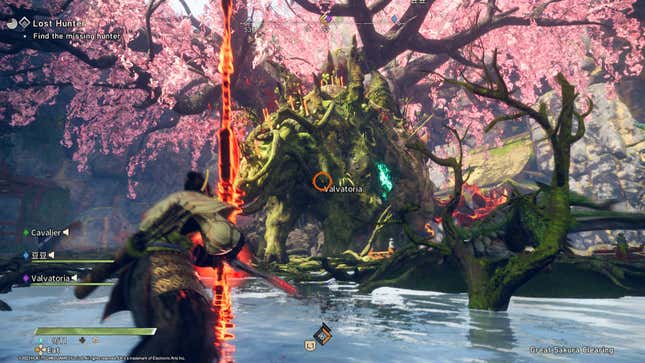
Sliding is even better than rolling
Wild Hearts has one of the most satisfying sliding maneuvers of any action game I’ve played. Anytime you’re sprinting, simply press the roll button to slide instead. You’ll get a big speed boost and cover over double the distance.
Dodge into attacks
Perhaps no bit of action game wisdom has better stood the test of time, but it bears repeating: if an enemy is changing you, try to dodge into it instead of away. Kemono have wild range, and many of their attacks will travel farther than you expect. Dodging to the side works well. In instances where a Wildtusk or Fumebeak is ready to pounce, try sliding underneath and behind it instead. The invisibility frames will help get you safely to the otherside.
Aim for the head
Every Kemono has specific weak spots, but most of them are vulnerable in the head and tail. When all else fails just aim there. Plus, many Kemono have special materials like horns and antlers that can be cut off of their head when enough damage is dealt, so focusing there will also reward you with more loot.
Heal early and often
This sounds like a no brainer, but Wild Hearts is not the type of game where you want to be flirting with less than 50 percent health. I basically use healing water any time I’m below 75 percent because you never know when a Kemono might one-shot you or catch you in a series of attacks that don’t leave you stunned or worse.
Always upgrade your oldest piece of armor
At least in the first half of the game, you’ll be unlocking new armor sets and the materials needed to craft them quite frequently. Rather than try to complete an entire set, it’s best to craft the newest armor piece you can for the oldest slot you have. Later on you can get more precious about elemental resistance and specific perks. For the most part though, the overall defense boost will be what’s most important.
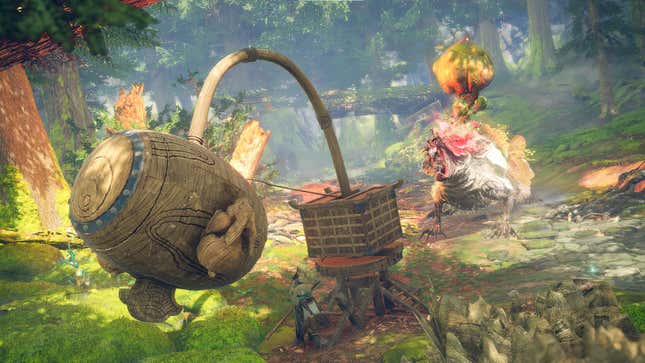
Smash with your mallet
My favorite Karakuri by far is the pounder. Stack three springs on top of one another and they’ll transform into a giant mallet. The wind up takes a couple of seconds, but when it hits it will do nearly 200 damage. Also it’s also just super satisfying to watch. Since it costs a bunch of thread, your best bet is to wait until the Kemono you’re fighting is knocked to the ground or has just finished one of its three move combos.
Enhance your claws
Wild Hearts has a bunch of different weapons, and encourages you to experiment with each one and make multiple copies that explore different parts of the enhancement tree. The claws are by far one of the most fun and powerful, however. At low range, they’re high risk. At the same time, filling up the special meter lets you grapple onto a Kemono and continuously fly around and attack them from above.
Snipe from a distance
If you’re struggling with the game’s melee combat, its bow is a fine alternative. The bow is great for hit and runs even though you need to remain within range. It’s also perfect for playing the long game, dodging constantly until a Kemono pauses and then pouncing with a double strong attack shot that will do 100-200 damage in a single hit.
Harvest crystals and upgrade your pits
Dragon Pits can be upgraded using crystals harvested from smaller Kemono carcasses. You’ll notice them because a bunch of butterflies will be fluttering above it. You don’t have to visit the Dragon Pit to upgrade it either. There’s an option to do it from the detail map screen, letting you get back to placing your Dragon Karakuri without missing a beat.